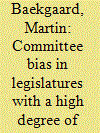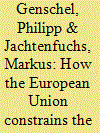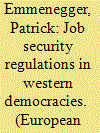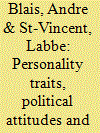|
|
|
Sort Order |
|
|
|
Items / Page
|
|
|
|
|
|
|
| Srl | Item |
| 1 |
ID:
103364


|
|
|
|
|
| Publication |
2011.
|
| Summary/Abstract |
The elections to the European Parliament (EP) held in June 2009 marked a breakthrough for the extreme right British National Party (BNP), while in other European states extreme right parties (ERPs) similarly made gains. However, the attitudinal drivers of support for the BNP and ERPs more generally remain under-researched. This article draws on unique data that allow unprecedented insight into the attitudinal profile of ERP voters in Britain - an often neglected case in the wider literature. A series of possible motivational drivers of extreme right support are separated out: racial prejudice, anti-immigrant sentiment, protest against political elites, Euroscepticism, homophobia and Islamophobia. It is found that BNP support in the 2009 EP elections was motivationally diverse, with racist hostility, xenophobia and protest voting all contributing significantly to BNP voting. The analysis suggests that the BNP, which has long been a party stigmatised by associations with racism and violent extremism, made a key breakthrough in 2009. While racist motivations remain the strongest driver of support for the party, it has also begun to win over a broader coalition of anti-immigrant and anti-elite voters.
|
|
|
|
|
|
|
|
|
|
|
|
|
|
|
|
| 2 |
ID:
103358


|
|
|
|
|
| Publication |
2011.
|
| Summary/Abstract |
The institution of committees in democratic legislatures has for years been said to bias policy making because the preferences of committee members differ from, and are more alike than, those of other legislators due to self-selection to the committees. Based on an analysis of United States Senate committees, Hall and Grofman suggested in 1990 that the preferences of committee members primarily diverge from, and are more alike than, those of non-committee members on policy issues that are salient to constituencies or at least to an easily definable segment of constituencies. This article argues that the logic of Hall and Grofman should in fact be reversed in legislatures characterised by highly cohesive parties. Accordingly, the main hypothesis is that in such legislatures the preferences of committee members are more likely to be alike than those of non-committee members in the committees that work with policy issues of less salience to constituencies. Using a large-scale comparative design comprising data collected in 2008 on the spending preferences of 1,348 Danish local politicians, evidence is found supporting this hypothesis. This finding points to the importance of considering the role of parties when assessing committee bias.
|
|
|
|
|
|
|
|
|
|
|
|
|
|
|
|
| 3 |
ID:
103357


|
|
|
|
|
| Publication |
2011.
|
| Summary/Abstract |
This article challenges the common assumption that the European Union (EU) has little power over taxation. Based on a comprehensive analysis of EU tax legislation and European Court of Justice (ECJ) tax jurisprudence from 1958 to 2007, the article shows that the EU exerts considerable regulatory control over the Member States' taxing power and imposes tighter constraints on Member State taxes than the American federal government imposes on American state taxation. These findings contradict the standard account of the EU as a regulatory polity that specialises in apolitical issues of market creation and leaves control of highly politicised core functions of government (defence, taxation, social security, education, etc.) to the Member States; despite strong treaty safeguards, national tax autonomy is undermined by EU regulation.
|
|
|
|
|
|
|
|
|
|
|
|
|
|
|
|
| 4 |
ID:
103359


|
|
|
|
|
| Publication |
2011.
|
| Summary/Abstract |
This article uses fuzzy set qualitative comparative analysis (fsQCA) to examine the determinants of job security regulations - here understood as restrictions on hiring and firing - in Western democracies. Unlike previous studies, the analysis reveals three different paths to high levels of job security regulations. The first path covers the Southern European state capitalist countries. In these countries, conflicts between forces pushing for liberal democracy and groups alienated from modernisation have led to high levels of statism and crowded out other societal actors. Job security regulations were enacted relatively early in order to provide social security by means available to the state. Due to fragmented welfare states, job security regulations have remained one of the most important pillars of the social protection regime. The second path covers the Continental European managed capitalist countries and is also characterised by high levels of statism. In these countries, repressive governments employed a stick-and-carrot strategy to weaken the labour movement and tie the loyalties of the individual to the state. After the Second World War, these countries developed corporatist intermediation systems and encompassing and generous welfare states. Finally, the third path covers the Nordic managed capitalist countries. This path is characterised by a high degree of non-market coordination, strong labour movements and few institutional veto points. In the Nordic managed capitalist countries, job security regulations traditionally have been subject to collective agreements. However, in the 1960s, labour movements succeeded in pushing through the public legislation of job security despite opposition from employers' associations. Methodologically, this article demonstrates that cross-national differences in the level of job security regulations can only be explained if the methods used allow for complex causality. In contrast, methods which focus on 'net effects' do not offer satisfactory explanations for the cross-national differences in the level of job security regulations.
|
|
|
|
|
|
|
|
|
|
|
|
|
|
|
|
| 5 |
ID:
103360


|
|
|
|
|
| Publication |
2011.
|
| Summary/Abstract |
Numerous studies have demonstrated a weakening identification of voters with political parties in Western Europe over the last three decades. It is argued here that the growing proportion of voters with weak or no party affinities has strong implications for economic voting. When the proportion of voters with partisan affinities is low, the effect of economic performance on election outcomes is strong; when partisans proliferate, economic conditions matter less. Employing Eurobarometer data for eight European countries from 1976 to 1992, this inverse association between partisanship and the economic vote is demonstrated. This finding implies a growing effect for the objective economy on the vote in Europe. It helps explain an important puzzle in the economic voting literature: Weak results in aggregate level cross-national studies of economic voting may be attributable to characteristics of the electorate, not just to the characteristics of government.
|
|
|
|
|
|
|
|
|
|
|
|
|
|
|
|
| 6 |
ID:
103362


|
|
|
|
|
| Publication |
2011.
|
| Summary/Abstract |
This article examines the link between personality traits, political attitudes and the propensity to vote in elections, using an Internet panel survey conducted in two Canadian provinces at the time of the 2008 federal election and the subsequent provincial elections. It first establishes that the two most proximate attitudes that shape one's propensity to vote are political interest and sense of civic duty. The article then look at specific personality traits (altruism, shyness, efficacy and conflict avoidance) that could affect level of political interest, civic duty and the propensity to vote in elections. In the last part of the analysis, a model is proposed and tested, according to which the impact of personality traits is indirect, being mediated by interest and duty. The article shows that the data are consistent with such an interpretation.
|
|
|
|
|
|
|
|
|
|
|
|
|
|
|
|
|
|
|
|
|